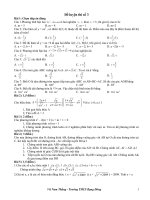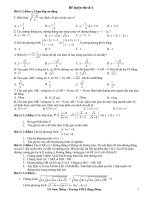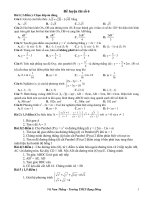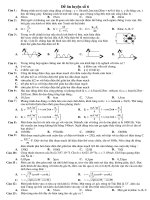TRUNG TÂM NN NÚI THÀNH ĐỀ LUYỆN THI SỐ 4 docx
Bạn đang xem bản rút gọn của tài liệu. Xem và tải ngay bản đầy đủ của tài liệu tại đây (218 KB, 6 trang )
Trang 1-Mã đề _ _ _ _
TRUNG TÂM NN NÚI THÀNH ĐỀ LUYỆN THI ĐẠI HỌC, CAO ĐẲNG
ĐỀ LUYỆN THI SỐ 4 Môn thi: TIẾNG ANH; Khối: D
(Đề thi có 04 trang) Thời gian làm bài: 90 phút.
Họ, tên thí sinh: Số báo danh: Mã đề thi 103
ĐỀ THI GỒM 80 CÂU (TỪ QUESTION 1 ĐẾN QUESTION 80) DÀNH CHO TẤT CẢ THÍ SINH
Mark the letter A, B, C or D on your answer sheet to indicate the word whose underlined part is pronounced
differently from that of the rest in each of the following questions.
Question 1: A. athlete B. thoughtful C. thin D. their
Question 2: A. athletic B. average C. aquatic D. avid
Question 3: A. most B. frost C. host D. post
Mark the letter A, B, C or D on your answer sheet to indicate the word whose main stress is placed differently
from the others.
Question 4: A. undertake B. disappear C. represent D. stimulate
Question 5: A. maintenance B. improvement C. engraving D. spectacular
Mark the letter A, B, C or D on your answer sheet to indicate the correct answer to each of the following
questions.
Question 6: Yesterday I _________ to a furniture store. I bought a new lamp there.
A. could go B. could have gone C. went D. ought to have gone
Question 7: I told him I’d prefer to walk, but he insisted _________ me a lift.
A. about giving B. to give C. on giving D. for giving
Question 8: If you _________ William, ask him to come and see me.
A. think of B. catch sight of C. find out D. have an idea of
Question 9: Five people _________ injured in the traffic accident.
A. reported to be B. are reporting C. are to be reported D. are reported to be
Question 10: She was made _________ over the passport.
A. hand B. to hand C. handing D. handed
Question 11: Does he tell you how he is getting _________ his new colleagues?
A. on with B. on of C. away with D. out of
Question 12: Smoking and drinking bring _________ a quick decline in health and fitness.
A. up B. about C. in D. off
Question 13: Conservation is _________ great importance in saving the environment.
A. in B. of C. at D. for
Question 14: Either Jim or John _________ here.
A. lives B. has lived C. are living D. live
Question 15: This work must be undertaken by a _________ person.
A. good-qualified B. good qualification C. well-qualifying D. well-qualified
Question 16: I am fed up _________ being told what to do every day by my parents.
A. about B. in C. for D. with
Question 17: A friend in need is a friend _________.
A. in really B. in fact C. indeed D. in truth
Question 18: I think the invention of computer is the greatest scientific _________ of the 20
th
century.
A. breakdown B. break C. breakable D. breakthrough
Question 19: “What a beautiful T-shirt you are wearing!” - “Oh, _______. ”
A. Of course it is B. Never mind C. Not very beautiful D. Glad you like it
Question 20: I was _______ to concentrate because of all the noise.
A. unable B. disable C. inability D. disability
Question 21: Something funny _______ in class yesterday.
A. happened B. happens C. is happened D. was happened
Question 22: When I say “I have no idea”, I mean “ _______”.
A. I don’t know B. I have no money left C. I have no doubt D. I haven’t decided
yet.
Question 23: He won’t pass his examination unless _______
A. he is diligent B. he was diligent C. he isn’t diligent D. he not diligent
enough
Question 24: I’ve been feeling _______ tired lately, doctor.
A. such a B. the most C. more and more D. much
Trang 2-Mã đề _ _ _ _
Question 25: "What is your sister like?" - "_________."
A. Really annoying. B. She's tall and slim with brown eyes.
C. She's over there. D. Everything, especially music and movies.
Read the following passage and mark the letter A, B, C or D on your answer sheet to indicate the correct
word or phrase for each of the numbered blanks from 26 to 35
A YEAR WITH OVERSEAS VOLUNTEERS
I was with Overseas Volunteers (OV) for a year after leaving university and I was sent to an isolated village
in Chad, about 500 km (26) _____ the capital N'Djamena. Coming from a rich country, I got quite a shock, as
conditions were much harder than I had (27) _____. But after a few days I soon got used to (28) _____ there.
The people were always very friendly and helpful, and soon I began to appreciate how beautiful the countryside
was.
One of my jobs was to supply the village with water. The well was a long walk away. And the women (29)
_____ to spend a long time every day (30) _____ heavy pots backwards and forwards. So I contacted
organization and arranged to have some pipes delivered. We built a simple pipeline and a pump, and it worked
first time. It wasn't perfect – there were a few leaks but it made a great difference (31) _____ the villagers, had
never had running water before. And not (32) _____ did we have running water, but in the evening it was hot,
because the pipe had been lying in the sun all day.
All in all, I think my time with OV was a good (33) _____ . Although it was not well-paid, it was well (34)
_____ doing, and I would recommend it to anyone who was (35) _____ working for a charity.
Question 26: A. from B. in C. of D. to
Question 27: A. felt B. planned C. found D. expected
Question 28: A. live B. lived C. living D. lives
Question 29: A. liked B. tried C. ought D. used
Question 30: A. fetching B. carrying C. wearing D. holding
Question 31: A. to B. for C. with D. in
Question 32: A. hardly B. scarcely C. only D. sooner
Question 33: A. occasion B. experience C. opportunity D. job
Question 34: A. work B. value C. worth D. cost
Question 35: A. considering B. going C. planning D. thinking
Read the following passage and mark the letter A, B, C or D on your answer sheet to indicate the correct
answer to each of the questions from 36 to 40
A recent investigation by scientists at the U.S. Geological Survey shows that strange animal behaviour
might help predict future earthquake. Investigators found such occurrences about ten kilometers from where a
recent earthquake took place. Some birds made strange sounds and flew wildly, dogs barked and ran around
uncontrollably.
Scientists believe that animals can sense these environmental changes as early as several days before the
disaster.
In 1976 after observing animal behaviour, the Chinese scientists were able to predict a terrifying
earthquake. Although hundreds of thousands of people were killed, the government was able to evacuate
millions of other people and thus keep the death toll at a lower level.
Question 36: What prediction may be made by observing animal behaviour?
A. The number of people who will be killed B. A likely earthquake
C. Environmental changes D. The number of people who will be evacuated
Question 37: Why are animals aware of these changes when humans are not?
A. Animals are clever than humans.
B. Animals have certain instincts that human do not.
C. Animals can feel the shaking of the earth by running around the house.
D. Humans don’t know where to look.
Question 38: Which of the following is NOT TRUE according to the passage?
A. Some animals may be able to sense a coming earthquake.
B. By observing animal behaviour, scientists can predict earthquakes.
C. The Chinese scientists have successfully predicted an earthquake and saved many lives.
D. All birds and dogs in surrounding areas went wild before the earthquake.
Question 39: If scientists can accurately predict earthquakes, there will be _______ .
A. fewer animals going wild. B. a greater number of survivors
C. fewer people evacuated D. fewer environmental changes
Question 40: The word "evacuate" in the passage most closely means _______ .
A. exile B. remove C. expel D. replace
Trang 3-Mã đề _ _ _ _
Mark the letter A, B, C or D on your answer sheet to indicate the correct answer to each of the following
questions.
Question 41: It is such a heavy suitcase _________.
A. for me to carry B. that I can't carry C. for me to carry it D. that I can't carry it
Question 42: _________ , I wouldn’t have been able to move the table.
A. If Jack didn't help B. If it hadn't been Jack C. Without Jack’s help D. If Jack couldn’t give me
a hand
Question 43: The class was cancelled _________.
A. if there weren’t enough students. B. because there weren’t enough students.
C. even though there weren’t enough students. D. unless there would be enough students.
Question 44: _________ that they had to reprint the book immediately.
A. The demand was so great B. Such a great the demand was
C. The book demanded D. It is such great demand
Question 45: That the earth revolves around the sun _________.
A. did not believe in the fifteen century. B. was not believed before the fifteen century
C. was not believed until the fifteen century D. had not believed before the fifteen century
Read the following passage and mark the letter A, B, C or D on your answer sheet to indicate the correct
answer to each of the questions from 51 to 60
As heart disease continues to be the number-one killer in the United States, researchers have become
increasingly interested in identifying the potential risk factors that trigger heart attacks. High-fat diets and "life
in the fast lane" have long been known to contribute to the high incidence of heart failure. But according to new
studies, the list of risk factors may be significantly longer and quite surprising.
Heart failure, for example, appears to have seasonal and temporal patterns. A higher percentage of heart
attacks occur in cold weather, and more people experience heart failure on Monday than on any other day of the
week. In addition, people are more susceptible to heart attacks in the first few hours after waking. Cardiologists
first observed this morning phenomenon in the mid-1980, and have since discovered a number of possible
causes. An early-morning rise in blood pressure, heart rate, and concentration of heart stimulating hormones,
plus a reduction of blood flow to the heart, may all contribute to the higher incidence of heart attacks between
the hours of 8:00 A.M. and 10:00 A.M.
In other studies, both birthdays and bachelorhood have been implicated as risk factors. Statistics reveal
that heart attack rates increase significantly for both females and males in the few days immediately preceding
and following their birthdays. And unmarried men are more at risk for heart attacks than their married
counterparts. Though stress is thought to be linked in some way to all of the aforementioned risk factors, intense
research continues in the hope of further comprehending why and how heart failure is triggered.
Question 46: What does the passage mainly discuss?
A. risk factors in heart attacks B. seasonal and temporal patterns of heart attacks
C. cardiology in the 1980s D. diet and stress as factors in heart attacks
Question 47: The word potential could best be replaced by _________.
A. harmful B. primary C. unknown D. possible
Question 48: The word trigger is closest in meaning to which of the following?
A. involve B. affect C. cause D. encounter
Question 49: Which of the following could best replace the word incidence as used in the passage?
A. increase B. rate C. chance D. factor
Question 50. The phrase susceptible to could best be replaced by _______.
A. aware of B. affected by C. accustomed D. prone to
Question 51. According to the passage, which of the following is NOT a possible cause of many heart attacks?
A. decreased blood flow to the heart B. increased blood pressure
C. lower heart rate D. increase in hormones
Question 52. The word implicated could best be replaced by which of the following?
A. indicated B. disregarded C. investigated D. discovered
Question 53. Which of the following is NOT cited as a possible risk factor?
A. having a birthday B. getting married C. eating fatty foods D. being under stress
Question 54. Which of the following does the passage infer?
A. We now fully understand how risk factors trigger heart attacks.
B. We recently began to study how risk factors trigger heart attacks.
C. We have not identified many risk factors associated with heart attacks.
D. We do not fully understand how risk factors trigger heart attacks.
Question 55. Which of the following could best replace the word reveal?
A. show B. observe C. mean D. explain
Trang 4-Mã đề _ _ _ _
Mark the letter A, B, C or D on your answer sheet to show the underlined part that needs correcting
Question 56: It is becoming extremely difficult to grow enough to feed the world's rapidly increased
population.
A B C D
Question 57: The bus driver told the man didn’t allow his disobedient son to hang out the window.
A B C D
Question 58: To be a good swimmer, John jumped into the water and rescued the drowning child.
A B C D
Question 59: We have always wanted to get as much good marks at school as we can.
A B C D
Question 60: Had you sent the application form to that company, you would have offered a job.
A B C D
Read the following passage and mark the letter A, B, C or D on your answer sheet to indicate the correct
word or phrase for each of the numbered blanks from 61 to 70
Air pollution occurs when wastes dirty air. People produce most of the (61) ______ that cause air pollution.
Such wastes can be in the form of gases or particles of solid or (62) ______ matter. These substances result
chiefly from burning (63) ______ to power motor vehicles and to heat buildings. Industrial processes and the
(64) ______ of garbage also contribute to air pollution, natural pollutants (impurities) include dust, pollen, soil
particles and (65) ______ occurring gases.
The rapid growth of population and (66) ______ and the increasing use of automobiles and airplanes have
made air pollution a (67) ______ problem. The air we breathe has become so filled with pollutants that it can
cause (68) ______ problems. Polluted air also (69) ______ plants, animals, building materials and fabrics. In
addition, it causes (70) ______ by altering the earth’s atmosphere.
Question 61: A. wastes B. products C. garbage D. substances
Question 62: A. tiny B. liquid C. organic D. volcanic
Question 63: A. timber B. lead C. fuel D. carbon
Question 64: A. disposing B. emitting C. contaminating D. burning
Question 65: A. naturally B. unpleasantly C. odourless D. originally
Question 66: A. industry B. electricity C. smog D. exhaust
Question 67: A. harmless B. difficult C. poisonous D. serious
Question 68: A. environment B. city C. atmosphere D. health
Question 69: A. harms B. accounts for C. pollutes D. kills
Question 70: A. pollution B. harmful gases C. damage D. eruption
Mark the letter A, B, C or D on your answer sheet to indicate the sentence which has the same meaning as
the given one
Question 71: Peter takes after his father in many ways.
A. Peter gives way to his father. B. Peter looks very much like his father.
C. Peter takes his father away many times. D. Peter hardly resembles his father.
Question 72: We haven’t written to each other for two months.
A. It is two months that we wrote to each other. B. It is two months since we wrote together.
C. There are two months for us to write to each other. D. It is two months since we last wrote to
each other.
Question 73: If there is a fire, you should phone number 114.
A. In case of fire, phone number 114. B. The phone number of the fire brigade is 114
if necessary.
C. You should phone number 114 in case there is a fire. D. Please, phone number 114 because there is a
fire.
Question 74: Kate said, “You are not as intelligent as I thought, Bill.”
A. Kate had thought that Bill was stupid. B. Kate had thought that Bill was more
intelligent.
C. In Kate’s opinion, Bill was not so intelligent as her. D. Kate told Bill to think about his
intelligence.
Question 75: He received good education from an early age.
A. He was well brought up when he was young. B. When he was young he carried on with good
education.
C. The younger he was the better educated he was. D. Good education resulted in his active youth.
Mark the letter A, B, C or D on your answer sheet to show the correct sentence that can be made from the cues
given
Question 76: he/ leave home/ early/ not/ miss/ train
Trang 5-Mã đề _ _ _ _
A. Had he left home earlier, he wouldn’t have missed the train.
B. If he left home earlier, he wouldn’t miss the train.
C. Unless he left home earlier, he wouldn’t missed the train.
D. If he could leave home early, he didn’t miss the train.
Question 77: William / mistake/ because/ care/ read
A. William never make mistakes because he is a careful reader.
B. William hardly ever makes a mistake because he carefully reads.
C. Hardly does William make mistakes because he is a careful reader.
D. William never makes mistakes because of careful reading.
Question 78: By/ time/ you/ dinner/ film/ end
A. By the time you finish dinner, the film will have ended. B. By the time you can finish dinner, the film will
end.
C. By the time you finish a dinner, the film will be ended. D. By the time you finished dinner, the film was
ended.
Question 79: he/ be consider/ leading expert/ biology
A. He is considered to be leading expert in biology. B. He is considered to be a leading expert in
biology.
C. He is considered one of a leading expert in biology. D. He is considering as a leading expert in
biology.
Question 80: doctor/ suggest/ more exercise
A. The doctor suggested Mary to take more exercise. B. The doctor suggested Mary taking more
exercise.
C. The doctor suggested Mary take more exercise. D. The doctor suggested that Mary takes more
exercise.
THE END
ĐÁP ÁN
ĐÊ SỐ 3
1 A 11 B 21
A 31
B 41
B 51
B 61
B 71
A
2 C 12 C 22
A 32
D 42
C 52
D 62
C 72
B 8B be held down: be
delayed/blocked
3 B 13
C 23
B 33
A 43
A 53
C 63
B 73
D
4 D 14
D 24
C 34
D 44
D 54
A 64
A 74
B
to take up: chiếm chỗ trống/thgian;
bắt đầu học, chơi (môn thể thao để
giải trí)
5 C 15 D 25
B 35
A 45
D 55
D 65
D 75
A 14D: put up with sth: chịu đựng,
chấp nhận
6 B 16 C 26
D 36
D 46
A 56
C 66
C 76
A 66C: across
→ round/over
7 A 17 B 27
B 37
B 47
C 57
D 67
B 77
B 67B communication (không có -s)
8 B 18 A 28
A 38
B 48
B 58
D 68
B 78
C 68B unless → if
9 D 19 C 29
C 39
C 49
B 59
A 69
B 79
A 69B in saving
→ to save
10 A 20 A 30
D 40
B 50
C 60
B 70
D 80
B 70D rise
→ rises (Chủ từ: The
number )
ĐÊ SỐ 4
1 D 11
A 21
A 31
A 41 D 51
A 61
A 71
B
2 C 12
B 22
A 32
C 42 C 52
A 62
C 72
D 56D increased → increasing
3 B 13
B 23
A 33
B 43 B 53
B 63
C 73
B 57B didn’t allow
→ not to allow
4 D 14
B 24
C 34
C 44 A 54
D 64
A 74
B 58A To be
→ Being; 59B much →
many
5 A 15
D 25
A 35
A 45
C 55
A 65
A 75
A
6 C 16
D 26
A 36
A 46
A 56
D 66
A 76
A
60C would have offered → would
have been offred
7 C 17
C 27
D 37
B 47 D 57
B 67
D 77
C
8 B 18
D 28
C 38
D 48 C 58
A 68
D 78
A
9 D 19
B 29
D 39
B 49 B 59
B 69
A 79
B
10 B 20
A 30
B 40
B 50 B 60
C 70
C 80
C
Trang 6-Mã đề _ _ _ _









